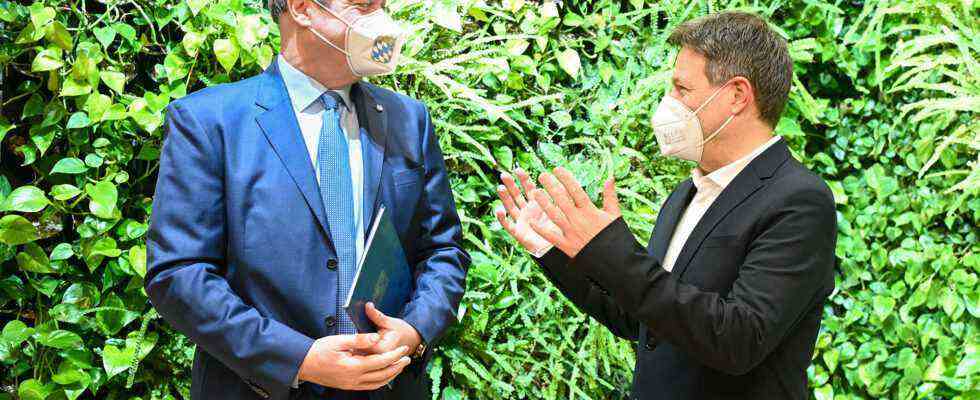Status: 01/20/2022 5:46 p.m
Economics Minister Habeck needs masses of new wind turbines if he wants to master the energy transition. But for this project he is dependent on the federal states. His visit to Bavaria shows how difficult that will be.
The politeness is a facade, the contrasts are great. However, this only becomes really clear at the very end of the press conference. The spokesman for Bavaria’s Prime Minister Markus Söder is about to end it when Federal Minister of Economics Robert Habeck takes the floor again.
When it comes to wind power, there is a kind of competition among the prime ministers, in which the one who prevents the most wins, says Habeck. There is little doubt that he means Söder. He replies that Bayern is always offensive. Habeck counters that he would like to see the offensive.
Pressure from all sides
For both Söder and Habeck, the topic of wind energy is both important and complicated. The Economics Minister needs as many new wind turbines as possible, without which neither the German expansion target for renewable energies nor the CO2 reduction target can be achieved.
Habeck therefore wants to reserve two percent of German territory for wind turbines. This can only work if all federal states participate. If one completely refuses, then probably others will too. Söder has pressure from two sides in the wind turbine debate. Some sit mainly in the influential parliamentary group of his CSU and would prefer not to have any new wind turbines.
The 10H regulation, which basically provides for large distances (ten times the system height) between the wind turbine and residential buildings, is sacred to them. On the other side are the Free Voters, Söder’s coalition partners, and the Association of Bavarian Business, which is usually close to the CSU. Both also believe that more wind energy is needed in Bavaria.
Unity only superficially
In accordance with the complicated overall situation, Söder and Habeck initially try to be demonstratively courteous after their conversation in the Bavarian State Chancellery. It is a positive style that Habeck comes to an inaugural visit, Söder whistles, and the Economics Minister is pleased that Söder made the visit he had announced so quickly possible.
But the dissent quickly becomes apparent: Söder thinks Habeck’s two-percent target is wrong and wants to keep his 10-hour rule. Habeck considers this to be “prevention planning”, and his body language reveals how little he thinks of what Söder is offering him for wind power expansion. While the Bavarian Prime Minister is speaking, Habeck turns to him, sometimes with a stern look, sometimes neutrally, sometimes slightly mockingly.
He knows that he can ban the Bavarian 10H rule by building law. Söder instructs Habeck that Bavaria does not have a state government, but a state government, and grins when the still-Greens chairman is asked by a reporter about the Berlin public prosecutor’s investigations into infidelity.
Further resistance expected
The bottom line is a minimum consensus: Bavaria wants to present the federal government with a plan by March on how the expansion of wind turbines in Bavaria could gain momentum despite the 10H rule, perhaps with more wind turbines in the forest. The joint press conference showed Söder and Habeck what they could expect in the near future when it comes to wind energy.
Söder faces both the public image of a wind power refuser and a ban on the 10H rule. And Habeck has to reckon with the fact that Prime Ministers of other countries do not want to expect their populations to have as many wind turbines as his expansion plans require.

